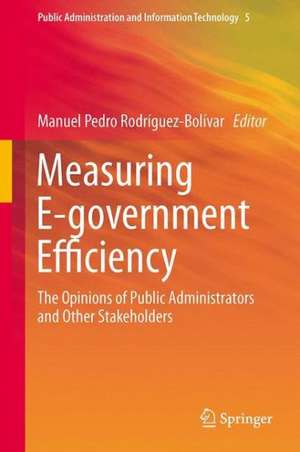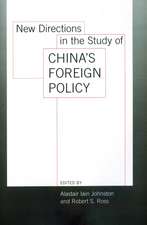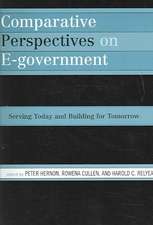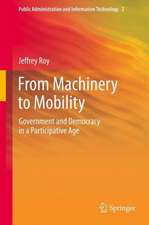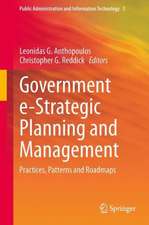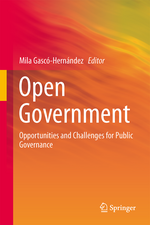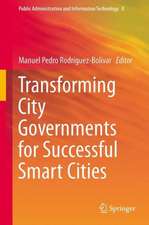Measuring E-government Efficiency: The Opinions of Public Administrators and Other Stakeholders: Public Administration and Information Technology, cartea 5
Editat de Manuel Pedro Rodríguez-Bolívaren Limba Engleză Hardback – 19 mar 2014
| Toate formatele și edițiile | Preț | Express |
|---|---|---|
| Paperback (1) | 640.71 lei 43-57 zile | |
| Springer – 23 aug 2016 | 640.71 lei 43-57 zile | |
| Hardback (1) | 651.51 lei 43-57 zile | |
| Springer – 19 mar 2014 | 651.51 lei 43-57 zile |
Din seria Public Administration and Information Technology
- 20%
 Preț: 689.21 lei
Preț: 689.21 lei - 18%
 Preț: 944.19 lei
Preț: 944.19 lei - 18%
 Preț: 1121.13 lei
Preț: 1121.13 lei - 15%
 Preț: 652.64 lei
Preț: 652.64 lei - 18%
 Preț: 1010.03 lei
Preț: 1010.03 lei - 15%
 Preț: 649.06 lei
Preț: 649.06 lei - 15%
 Preț: 638.57 lei
Preț: 638.57 lei - 20%
 Preț: 336.35 lei
Preț: 336.35 lei - 15%
 Preț: 650.04 lei
Preț: 650.04 lei - 15%
 Preț: 639.08 lei
Preț: 639.08 lei - 20%
 Preț: 562.85 lei
Preț: 562.85 lei -
 Preț: 386.22 lei
Preț: 386.22 lei - 18%
 Preț: 787.91 lei
Preț: 787.91 lei - 18%
 Preț: 783.20 lei
Preț: 783.20 lei - 18%
 Preț: 791.57 lei
Preț: 791.57 lei - 18%
 Preț: 958.07 lei
Preț: 958.07 lei - 15%
 Preț: 643.00 lei
Preț: 643.00 lei - 18%
 Preț: 1230.35 lei
Preț: 1230.35 lei - 18%
 Preț: 894.16 lei
Preț: 894.16 lei - 18%
 Preț: 784.13 lei
Preț: 784.13 lei - 15%
 Preț: 648.24 lei
Preț: 648.24 lei - 18%
 Preț: 778.45 lei
Preț: 778.45 lei - 18%
 Preț: 891.33 lei
Preț: 891.33 lei - 18%
 Preț: 1009.22 lei
Preț: 1009.22 lei - 18%
 Preț: 722.40 lei
Preț: 722.40 lei - 18%
 Preț: 893.05 lei
Preț: 893.05 lei - 15%
 Preț: 646.62 lei
Preț: 646.62 lei - 18%
 Preț: 888.01 lei
Preț: 888.01 lei - 24%
 Preț: 754.46 lei
Preț: 754.46 lei - 18%
 Preț: 789.03 lei
Preț: 789.03 lei - 15%
 Preț: 637.59 lei
Preț: 637.59 lei - 15%
 Preț: 642.51 lei
Preț: 642.51 lei - 18%
 Preț: 797.55 lei
Preț: 797.55 lei
Preț: 651.51 lei
Preț vechi: 766.49 lei
-15% Nou
Puncte Express: 977
Preț estimativ în valută:
124.67€ • 130.49$ • 103.76£
124.67€ • 130.49$ • 103.76£
Carte tipărită la comandă
Livrare economică 31 martie-14 aprilie
Preluare comenzi: 021 569.72.76
Specificații
ISBN-13: 9781461499817
ISBN-10: 146149981X
Pagini: 304
Ilustrații: XV, 285 p. 37 illus., 8 illus. in color.
Dimensiuni: 155 x 235 x 22 mm
Greutate: 0.73 kg
Ediția:2014
Editura: Springer
Colecția Springer
Seria Public Administration and Information Technology
Locul publicării:New York, NY, United States
ISBN-10: 146149981X
Pagini: 304
Ilustrații: XV, 285 p. 37 illus., 8 illus. in color.
Dimensiuni: 155 x 235 x 22 mm
Greutate: 0.73 kg
Ediția:2014
Editura: Springer
Colecția Springer
Seria Public Administration and Information Technology
Locul publicării:New York, NY, United States
Public țintă
ResearchCuprins
1. Introduction.- 2. Rethinking E-government Evaluation.- 3. Data Openness Evaluation: How open is your public Government data?.- 4. Measuring Usability to Improve the Efficiency of Electronic Signature-based E-Government Solutions.- 5. State-of-the-art review: Measuring efficiency and impact.- 6. Generic Mechanisms reflecting Technology Adoption Decisions: Lessons from the UK e-Voting Pilot Schemes.- 7. Measuring E-Government Efficiency from the Perspective of Implementers: The Case of E-Budgeting in Mexico.- 8. Public manager' perceptions of Spanish e-government efficiency at the municipal level: A case study.- 9. E-government and social media: the challenges and risks of online activities by civil servants.- 10. Managing E-government development. Stakeholder views from providers and citizens.- 11. Manchester as a Digital Powerhouse: Governing the ICT-related Developments.- 12. Digital Divide and the Study of Electronic Government Demand. An Empirical Analysis of Spain.- 13. A Quantitative Study to Assess the Probable Success Factors Effective on Different Stakeholder Groups in Turkish e-Government Transformation.- 14. Perceptions about e-participation effectiveness. A multistakeholder perspective.- 15. Conclusion.
Textul de pe ultima copertă
E-government has the potential to improve public services, information transparency, and the engagement of civic participation of the public sector management. This book analyzes the achievement of expectations created by public managers, policy-makers, and stakeholders with regard to the implementation of e-government policies and applications. It also tries to determine whether e-government applications have been introduced as a fad or according to real demands from citizenry and if efforts within e-government have been effective. This book investigates how public managers and policy-makers imagine e-government policies and the impact of those policies on their management and decision-making process through the engagement of citizenry. It is also discusses whether e-government policies are merely procedural improvements that strictly introduce new ways of delivering public services or disclosing public sector information. The book's analysis of the overall expectations on e-government applications makes it of interest to scholars in public administration as well as to policy-makers and stakeholders.
Caracteristici
Analyzes the perceptions of efficiency of e-government technologies by public sector officials and politicians Focuses on how e-government efficiency could be measured and why similar e-government initiatives result in different outcomes in different contexts Investigates why public managers and politicians are undertaking e-government projects and why stakeholders could be forcing public administrations to undertake e-government projects Includes supplementary material: sn.pub/extras
